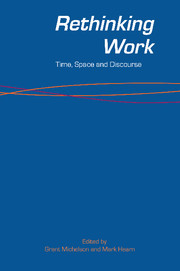Book contents
- Frontmatter
- Contents
- Tables and Figure
- Contributors
- Editorial Statement
- Abbreviations
- 1 Going to a New Place
- PART I TIME
- PART II SPACE
- PART III DISCOURSE
- 11 The National Narrative of Work
- 12 Shareholder Value and Corporate Social Responsibility in Work Organisations
- 13 Rethinking HRM
- 14 Identifying the Subject
- 15 Constructing Older Workers
- COMMENTARY
- Index
14 - Identifying the Subject
Worker Identity as Discursively Constructed Terrain
Published online by Cambridge University Press: 05 June 2012
- Frontmatter
- Contents
- Tables and Figure
- Contributors
- Editorial Statement
- Abbreviations
- 1 Going to a New Place
- PART I TIME
- PART II SPACE
- PART III DISCOURSE
- 11 The National Narrative of Work
- 12 Shareholder Value and Corporate Social Responsibility in Work Organisations
- 13 Rethinking HRM
- 14 Identifying the Subject
- 15 Constructing Older Workers
- COMMENTARY
- Index
Summary
For all their centrality to the employment relationship, far too much has been assumed and far too little asked about how workers see themselves and their role in this ‘exchange’. As this chapter seeks to demonstrate, those management thinkers who write about human resource management base their understandings of what it is that employees themselves ‘really’ want from the employment relationship on a priori and essentialist assumptions about worker identity. Yet to dismiss these depictions of the worker as simply ‘flawed’ or ‘wrong’ would be to overlook important aspects of the nature and purpose of HRM – and, indeed, of all ‘modern’ labour management thought, talk and text. Whether formulated by academics or practitioners, the HRM literature is, we suggest, best understood not as a series of disinterested attempts to ‘understand’ the worker but rather as a sequence of normative interventions intended to objectify the worker and to shape the employment relationship and the identities of workers and managers alike within that relationship. As Jacques (1996: 69) observes, management texts are written for managers but about employees, ‘who are the object of research and theorising’. While this may no longer be a particularly novel insight, it does highlight the modern managerialist imperative to reduce worker identities to manageable proportions. More controversially, we suggest that a comparable process of worker objectification and essentialisation is evident in much of the literature in the critical management genre.
- Type
- Chapter
- Information
- Rethinking WorkTime, Space and Discourse, pp. 285 - 307Publisher: Cambridge University PressPrint publication year: 2006
- 6
- Cited by



